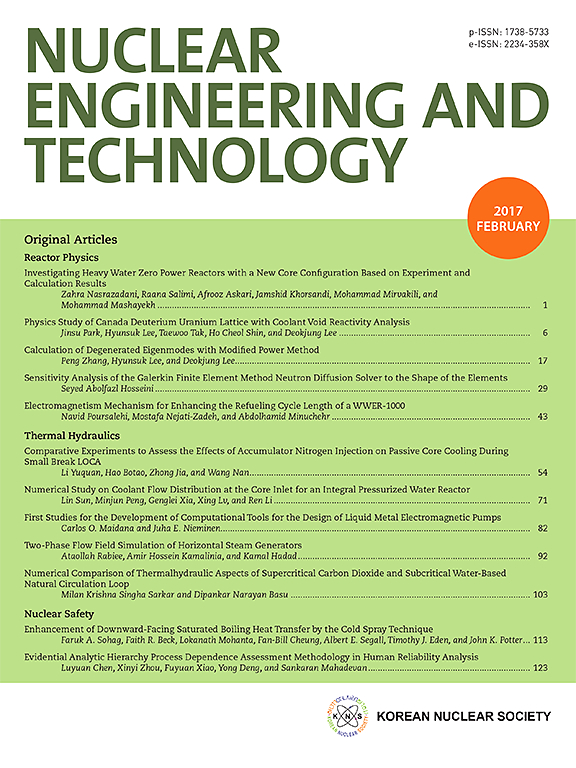Preliminary neutronics design and analysis of lithium heat pipe cooled space reactor with low-enriched uranium
IF 2.6
3区 工程技术
Q1 NUCLEAR SCIENCE & TECHNOLOGY
引用次数: 0
Abstract
The space nuclear reactor cooled by heat pipes has become the preferred choice for future space missions and deep space exploration missions. The use of low-enriched uranium (LEU) is promoted to achieve the goal of nuclear non-proliferation worldwide. In this study, a lithium heat pipe cooled space reactor with LEU (HP-LEU) was proposed based on Heat Pipes-Segmented Thermoelectric Module Converters (HP-STMCs), with the addition of moderators. The HP-LEU employs yttrium hydride (YH2) as the moderator and 19.9 % enriched uranium nitride (UN) as the fuel. The neutronics analysis has been performed on the HP-LEU reactor and the results have showed that the HP-LEU has a lifetime of more than 12 years. Two control systems have been applied in the reactor and have demonstrated the capacity to independently regulate and shut down the reactor. The total temperature reactivity coefficients are consistently negative, indicating that the HP-LEU reactor is inherently safe during operation. During normal operation, the temperatures of the materials are all acceptable. This study can serve as a reference for lithium heat pipe cooled space reactors with LEU.
使用低浓缩铀的锂热管冷却空间反应堆的初步中子设计与分析
用热管冷却的空间核反应堆已成为未来空间任务和深空探测任务的首选。为实现全球核不扩散的目标,低浓缩铀(LEU)的使用得到了推广。本研究基于热管-分段式热电模块转换器(HP-STMCs),提出了一种使用 LEU 的锂热管冷却空间反应堆(HP-LEU),并增加了慢化剂。HP-LEU 采用氢化钇(YH)作为慢化剂,19.9% 的浓缩氮化铀(UN)作为燃料。对 HP-LEU 反应堆进行了中子分析,结果表明 HP-LEU 的寿命超过 12 年。反应堆采用了两套控制系统,并证明其具有独立调节和关闭反应堆的能力。总温度反应系数始终为负值,表明 HP-LEU 反应堆在运行期间本质上是安全的。在正常运行期间,材料的温度都是可以接受的。这项研究可作为使用 LEU 的锂热管冷却空间反应堆的参考。
本文章由计算机程序翻译,如有差异,请以英文原文为准。
求助全文
约1分钟内获得全文
求助全文
来源期刊

Nuclear Engineering and Technology
工程技术-核科学技术
CiteScore
4.80
自引率
7.40%
发文量
431
审稿时长
3.5 months
期刊介绍:
Nuclear Engineering and Technology (NET), an international journal of the Korean Nuclear Society (KNS), publishes peer-reviewed papers on original research, ideas and developments in all areas of the field of nuclear science and technology. NET bimonthly publishes original articles, reviews, and technical notes. The journal is listed in the Science Citation Index Expanded (SCIE) of Thomson Reuters.
NET covers all fields for peaceful utilization of nuclear energy and radiation as follows:
1) Reactor Physics
2) Thermal Hydraulics
3) Nuclear Safety
4) Nuclear I&C
5) Nuclear Physics, Fusion, and Laser Technology
6) Nuclear Fuel Cycle and Radioactive Waste Management
7) Nuclear Fuel and Reactor Materials
8) Radiation Application
9) Radiation Protection
10) Nuclear Structural Analysis and Plant Management & Maintenance
11) Nuclear Policy, Economics, and Human Resource Development
 求助内容:
求助内容: 应助结果提醒方式:
应助结果提醒方式:


